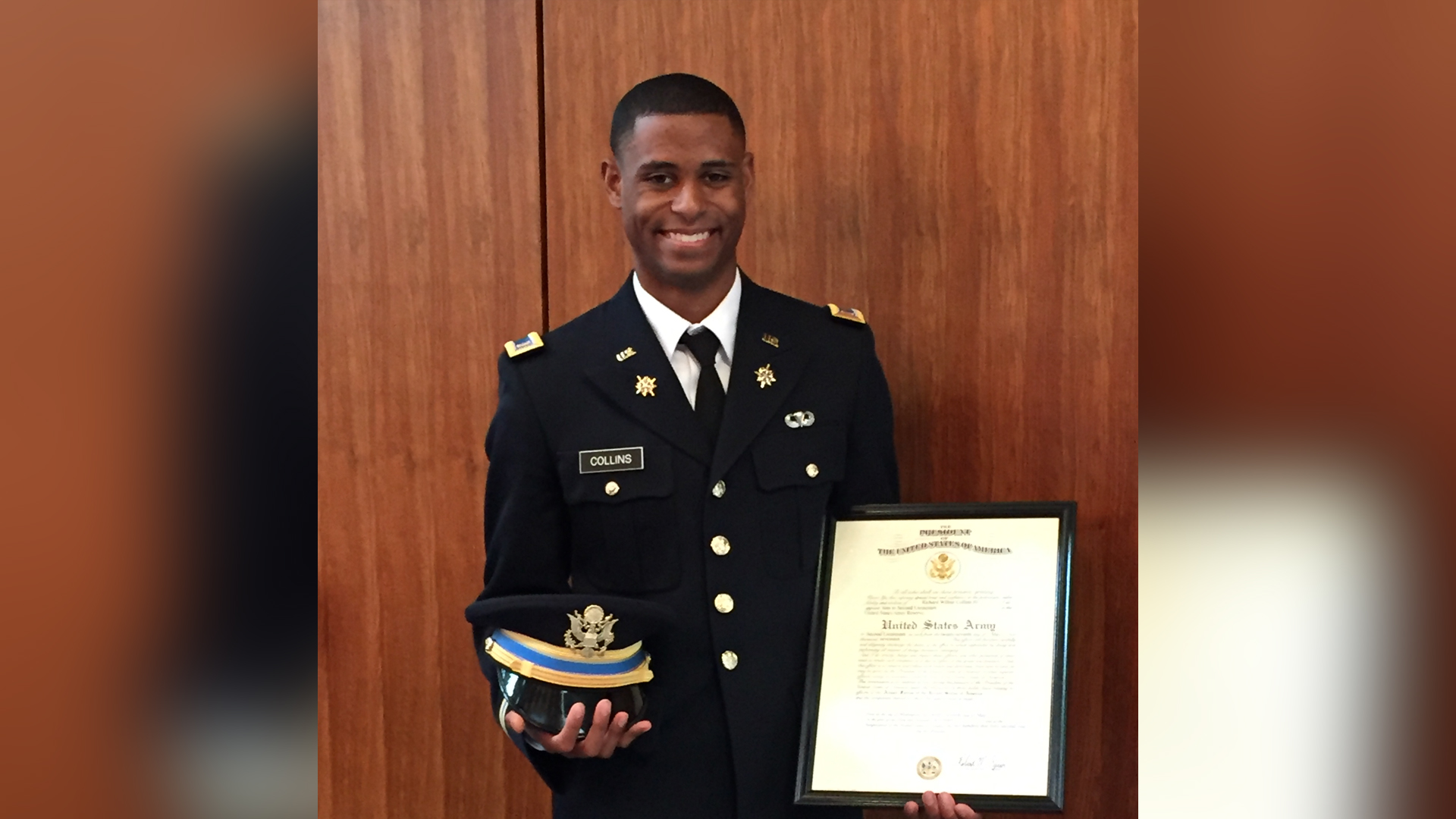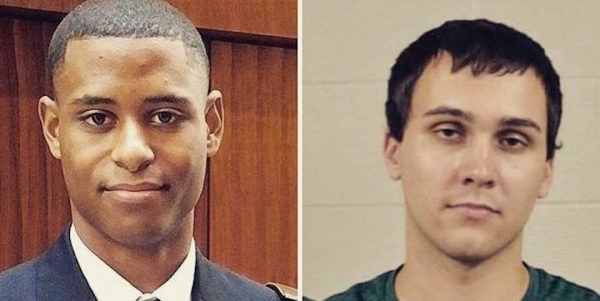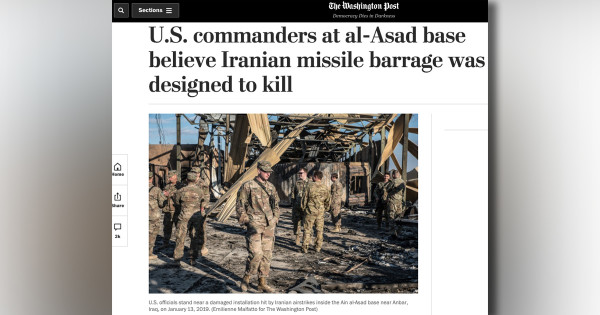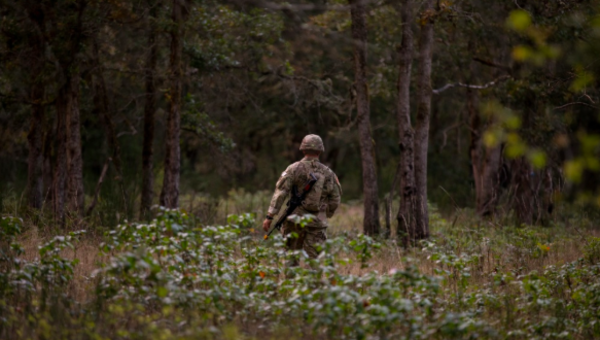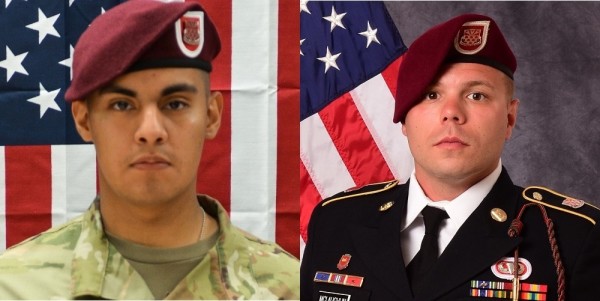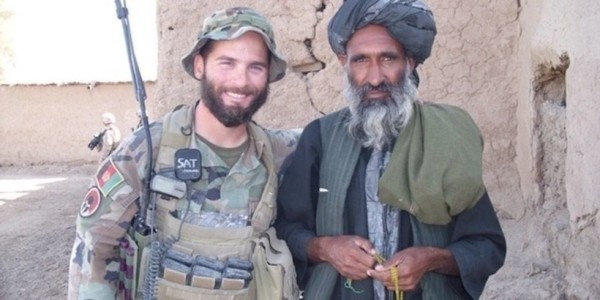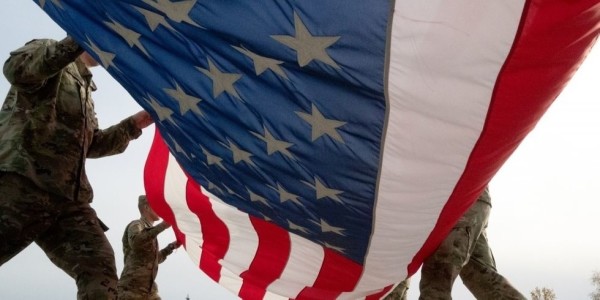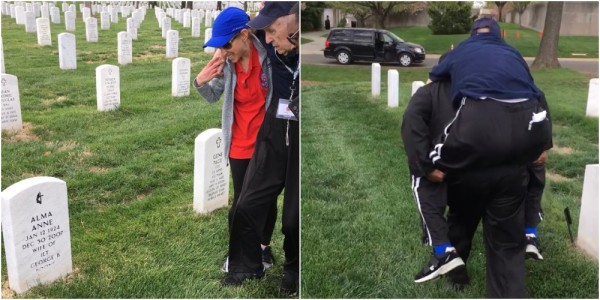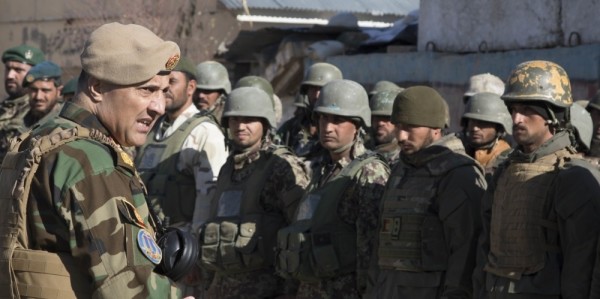Rick Collins was making breakfast sandwiches on the morning of May 20, 2017, when he heard two Maryland State Troopers ring his doorbell.
It had been a typical Saturday for Rick, a retired Navy veteran. He went outside early that morning to check on the new sprinkler system that had recently been installed in his front yard. After ensuring it was working properly, Rick went back inside to make breakfast, and when he heard the doorbell he thought it was probably his son Richard.
Richard Collins III had gone out with friends the night before. The 23-year-old had just been commissioned into the Army as a second lieutenant on Thursday and was excited about his career ahead as a military intelligence officer. It was “one of the happiest days” of his life when he commissioned, his mother Dawn recalled. When he left to see friends at the University of Maryland, he told his parents he’d be back on Saturday morning.
But when Rick went to the door, he saw only state troopers. They asked his name, and at that moment, he knew something was seriously wrong.
“It was a sinking feeling, just to stand there,” Rick said. “It was almost chilling. It was almost if I can describe it, it felt like my blood had stopped flowing. My stomach started to churn, and I knew.”
Despite his protests that they tell him first what was happening, the troopers asked that Rick have his wife join them. Once his wife Dawn reached the bottom of the stairs in the foyer of their home, the officers told them that their son had been killed. He had been stabbed at a bus stop early that Saturday morning in an apparent hate crime.
What happened in the days that followed was a blur. Rick described it as a scene in a movie, “where you see the scene shifting all over the place.” It felt like an out-of-body experience. But he and his wife soon discovered Army policies were not going to make it easy for their son to get military funeral honors, which they expected he would receive.
In the years that have passed since their son’s murder, that hasn’t changed. Today, Rick and Dawn Collins are waiting to have a request approved that would allow their son to be buried at Arlington National Cemetery in Virginia. With the backing of Maryland lawmakers, the couple submitted a request for an exception to the policy after being told their son wasn’t eligible.

And while Rick and Dawn continue to push for that right, they’re no longer just fighting for their own son. They know nothing, not even a burial at Arlington, will be able to change their loss. But they don’t think another family should have to go through what they’ve been through.
“We can’t do anything about Richard in a lot of ways,” Dawn said. “But by golly, no one else should have to do this.”
‘Our lives have not been the same since’
From a young age, Richard was a vivacious and driven kid, his parents said. He was a people person, athletic, had a “strong” belief in God, and loved to debate things he was passionate about.
At home, he worked at a public golf course, a Walmart, and a restaurant in order to “take some of the financial burden off us as his parents,” Rick wrote in a June 2021 letter requesting burial at Arlington National Cemetery. Richard was also very competitive. Dawn remembers one day when Richard teased his dad, who left the Navy as a petty officer 1st class, and suggested that one day he’d outrank him.
“My husband would say, ‘It might happen one day, but not today,’” Dawn said.
Richard was adventurous — the kind of adventurous that would push him to order the craziest thing on a restaurant menu just to try something new, and the kind of adventurousness that made the Army so appealing.

“It was good to see him, to watch him growing up, to reach a point where he found something that he felt he could embrace and something that he believed in and he was willing to pursue,” Rick said. But still, as parents often are, Rick and Dawn were a bit worried for their son, especially when he started telling them he wanted to go to Ranger school.
He wanted to explore the world, see new places, and experience different things. Richard made up his mind that after college, he wanted to complete Army ROTC and go on active duty. He “had a plan,” Rick said, and was determined on meeting the goals he’d set for himself.
“As a parent, you’re trying to guide their path and it’s kind of hard to let go and look at them as an independent, thinking, young adult,” Rick said. “You still see them as your child that you’ve got to guide along the path. But at some point you start accepting the fact that yeah, they’re going to have to strike out on their own and make their own decisions. I can’t speak for Dawn, but I was a little apprehensive at first, like are you sure that’s what you want to do? Because it can put you in some pretty, let’s say hairy circumstances.”
In 2013, Richard joined the ROTC program at Bowie State University in Maryland. He played soccer and lacrosse and was a long distance runner, as his father wrote. Richard was “a strong mentor to his peers,” and a volunteer tutor.
He “displayed strong work ethics as a public servant” even as a child, Rick wrote, and “worshiped consistently” with his family at his church in Prince Frederick, Maryland. On his way to being a third-generation service member, he “loved the United States of America,” and hung an American flag in his bedroom which still hangs there today.
But that desire to serve was “cut short by a racist young white male who did not know that our son [had] taken an oath to ‘Support and Defend the Constitution” Rick wrote.

Richard, a Black man, was waiting for an Uber at the University of Maryland when Sean Urbanski, a White 22-year-old, approached the young Army officer and said, “step left if you know what’s best for you.” When Richard said no, Urbanski stabbed him in the chest, then “pocketed the knife and sat down on a bench until police arrived,” the Associated Press reported.
“My son committed the unpardonable sin of saying, ‘No’ to a white man,” Dawn told Circuit Court Judge Lawrence Hill Jr., according to the AP.
Prosecutors argued that Urbanski was “poisoned” by hatred and targeted the Army lieutenant because he was Black. Urbanski reportedly had racist memes saved on his phone and was a member of a Facebook group titled “Alt-Reich: Nation.” But Urbanski’s defense attorneys argued that he was drunk and claimed there was “no evidence whatsoever” that the murder was a hate crime. Instead, attorney William Brennan Jr., said his client didn’t say any racial slurs during the attack and stabbed Richard because he was the closest to him when he walked up to the group at the bus stop.
Hill ultimately dropped the hate crime charge in 2019, saying prosecutors did not prove that Urbanski’s murder of Richard was motivated by hate. But he acknowledged in January that race was a factor in the killing.
“Race is always amongst us in the things we do and things we say,” Hill said, according to the AP. Urbanski was sentenced to life in prison in January after being found guilty of first-degree murder.

The day he received his sentence, Urbanski told Richard’s parents in court that there “hasn’t been a day that’s gone by where I haven’t thought about you and what I’ve done to you, and if I could switch places with your son I would in a heartbeat.”
But as Rick wrote in June, Urbanski’s conviction “is only the beginning of justice finally being served.” Since their son’s murder, Rick wrote, “extraordinary hurt and anguish … touches every aspect of our lives.”
“Our lives have not been the same since,” he wrote. “Nor is there any hope that it will ever be again.”
‘Mom: Lead, follow, or get out of the way’
When a soldier dies on active duty, the Army typically assigns their family a casualty assistance officer to help them navigate service policies and assist with funeral arrangements, but Rick and Dawn found that the Army “wasn’t going to step up” for their son due to a technicality.
Days after Richard’s death, a professor at Bowie State contacted the U.S. Army Cadet Command and requested an honor guard to be present at Richard’s funeral, according to Rick. But the professor later told them it wasn’t possible since Richard wasn’t eligible. His death exposed a gap in Army policy: Richard had been commissioned into the active duty Army but hadn’t yet arrived at his first assignment and was not officially considered active duty.

The date for an ROTC commissioned officer to officially be on active duty is typically “different (later) than the date of commission,” according to Army policy. They are officially on active duty “the date travel begins” to their basic officer leader course.
Rick and Dawn couldn’t understand it. Their son had just raised his right hand and taken the oath of commissioned officers. He was “no longer a cadet,” Rick said. “He’s in the United States Army.”
“I’m like, who thought of this?” Rick said. “This is insane, for someone to say after you raise your hand, you’re not officially a member of the armed services until you check into your first unit and get processed in.”
“For me,” Dawn said, “he took that oath. It was not like he could have come home that next day and said ‘I don’t want to do this, because I’m officially not in so I’m not going to do this.’”
The couple started communicating with their representatives in Maryland, asking for help and answers. That work eventually resulted in real legislative change: Sens. Chris Van Hollen (D-Md.) and Ben Cardin (D-Md.) introduced legislation in September 2019 that said a ROTC graduate who dies before receiving their first duty assignment “shall be treated as a member of the Armed Forces who dies on active duty.”
That legislation was included in the 2020 National Defense Authorization Act, but only applied to future instances. The next year, however, an amendment was included in the 2021 National Defense Authorization Act which made the new policy retroactive to May 1, 2017, and therefore able to be applied to Richard’s death.
“Lt. Richard Collins’ family will finally receive the much-deserved recognition of their son’s commitment and dedication to the Army and serving our nation,” Cardin said in July 2020. “While we pray no family has to endure the loss experienced by the Collins family, we hope this will set a precedent for the future.”
Rick said in his June letter that the Army has “recognized our son as an active-duty officer and bestowed upon him full military honors.” Richard was also posthumously promoted to first lieutenant in September 2020.
“2LT Collins’ actions on May 20, 2017, exhibited character and exemplary conduct of an officer of a higher rank,” then-Army Secretary Ryan McCarthy said. “In addition to standing firm in the face of evil, 2LT Collins was a model student and cadet at Bowie State University … Given the circumstances, it is my honor to recommend 2LT Richard W. Collins III for an honorary promotion to first lieutenant.”
Richard was posthumously promoted on Sept. 15, 2020.

Despite all of the change that has come in the years since Richard’s death, his parents are still waiting on one thing: Approval for him to be buried at Arlington National Cemetery.
In May, Rick was informed that Richard “does not meet eligibility criteria for interment or inurnment at Arlington National Cemetery,” in a letter from Karen Durham-Aguilera, the executive director of the Office of Army Cemeteries.
“Although the FY2021 National Defense Authorization Act authorized expansion of death gratuity for ROTC graduates,” Durham-Aguilera wrote, “that did not include the rights for burial at Arlington National Cemetery.”
She informed Rick that he would need to submit a request for an exception to policy, which would be decided by the Secretary of the Army and could take up to 120 days. So he did.
“That our son’s killer will be punished for his crime offers precious little consolation to us on a personal level, especially when one considers the burden of grief our family must bear for the remainder of his life,” Rick wrote in a June letter officially requesting burial for his son at Arlington. “Nevertheless, we remain resolute in our determination to pursue the rendering of the proper honors and respect for the courageous life our son lived, that we may give loving honor to his precious memory.”
Four members of Congress wrote a letter in support of Rick’s request. The lawmakers’ letter said that while Richard “does not meet the traditional criteria required for burial at ANC, his situation is unique and warrants serious consideration for a new grave exception.”

He had “every intention of reporting to his duty station” before he was “tragically murdered,” the lawmakers’ letter says. Rick’s letter emphasized the same, saying he and Dawn “strongly believe if our son had not been murdered on May 20, 2017, he would have been serving on active-duty as a top-notch military intelligence officer today.”
Those letters and more of the required paperwork to officially request the exception to policy were delivered to Arlington National Cemetery on Sept. 7, 2021, according to Lt. Col. Randee Farrell, spokeswoman for Army Secretary Christine Wormuth.
“The Exception to Policy documents are now being processed by the staff at ANC,” Farrell said on Wednesday. “Senior Army leaders will then review and provide a recommendation to the Secretary prior to her making a final decision on the request.”
“We are processing the request in accordance with Army policy,” said Barbara Lewandrowski, a spokeswoman for Arlington National Cemetery. “When the final decision is adjudicated by the Secretary of the Army we will notify the family.”
Dawn said that over the last few years it has felt like the Army is an organization that promises “all these great things,” but when it’s actually “time to show up, they say ‘Oh sorry, we really didn’t mean that.’” To her and her husband, having their son buried at Arlington would mean everything. It would mean the Army “takes care” of its own. And it would mean the Army is holding up its end of the bargain.
And for that reason, Dawn will continue to push forward. “As Richard would say,” Dawn said, “‘Mom: Lead, follow, or get out of the way.’”
More great stories on Task & Purpose
- Army finally reveals why a soldier is being court-martialed for a mysterious firefight in Syria
- ‘We need to wake up’ — Air Force Chief Bass calls out critics of ‘woke’ culture
- This Marine officer wants to charge a general with ‘dereliction of duty’ over Afghanistan. (He can’t)
- US troops are still in Syria and nobody can give a good answer as to why
- How Mark Milley became America’s most politicized general
- ‘You blessed us with light and love’ — America welcomes baby girl of Marine killed in Kabul
Want to write for Task & Purpose? Learn more here and be sure to check out more great stories on our homepage.

